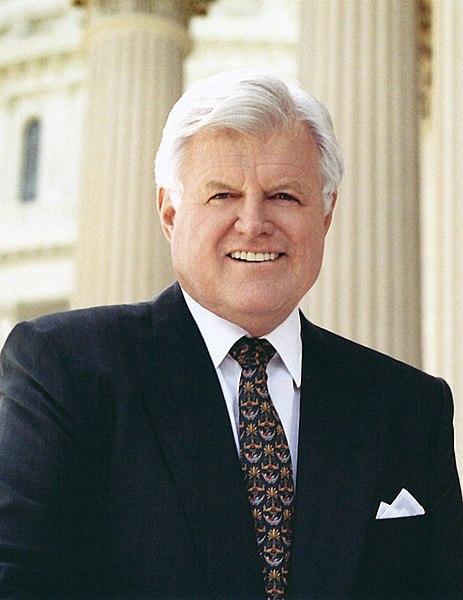Edward Moore "Ted" Kennedy (February 22, 1932 – August 25, 2009) was a United States Senator from Massachusetts and a member of the Democratic Party. First elected in November 1962, he was elected nine times and served for 46 years in the U.S. Senate. At the time of his death, he was the second most senior member of the Senate, and the third-longest-serving senator in U.S. history. For many years the most prominent living member of the Kennedy family, he was the son of Joseph P. Kennedy, Sr., the youngest brother of President John F. Kennedy and Senator Robert F. Kennedy, both victims of assassinations, and the father of Congressman Patrick J. Kennedy.
Kennedy entered the Senate in a 1962 special election to fill the seat once held by his brother John. He was elected to a full six-year term in 1964 and was reelected seven more times. The 1969 Chappaquiddick incident resulted in the death of automobile passenger Mary Jo Kopechne; Kennedy pleaded guilty to leaving the scene of an accident, and the incident significantly damaged his chances of ever becoming President of the United States. His one attempt, in the 1980 U.S. presidential election, resulted in a primary campaign loss to incumbent Democrat Jimmy Carter.
Kennedy was known for his oratorical skills; his 1968 eulogy for his brother Robert and his 1980 Democratic National Convention rallying cry for modern American liberalism were among his best-known speeches. He became known as "The Lion of the Senate" through his long tenure and influence. More than 300 bills that Kennedy and his staff wrote were enacted into law. He was a proud liberal who believed government can and should play a role to make America a more economically just society, but was also known for working with Republicans to find compromises among senators with disparate views. Kennedy played a major role in passing many laws, including laws addressing immigration, cancer research, health insurance, apartheid, disability discrimination, AIDS care, civil rights, mental health benefits, children's health insurance, education and volunteering. In the 2000s, he led several unsuccessful immigration reform efforts. Over the course of decades, Kennedy's "cause of my life" was the enactment of universal health care, which he continued to work toward during the Obama administration.
In May 2008, Kennedy was diagnosed with a malignant brain tumor which limited his appearances in the Senate. He died on August 25, 2009, at his home in Hyannis Port, Massachusetts. At the time of his death, he had come to be viewed as the "voice" and "conscience" of American progressivism.[1]
The Hail Mary or Ave Maria in Latin has been set to music numerous times. Among the most famous settings is the version by Charles Gounod (1859), adding melody and words to Johann Sebastian Bach's first prelude from the Well-Tempered Clavier. Antonín Dvořák's version was composed in 1877. Another setting of Ave Maria was written by Giuseppe Verdi for his 1887 opera Otello. Russian composer César Cui, who was raised Roman Catholic, set the text at least three times: as the "Ave Maria", op. 34, for 1 or 2 women's voices with piano or harmonium (1886), and as part of two of his operas: Le Flibustier (premiered 1894) and Mateo Falcone (1907). Settings also exist by Mozart, Byrd, Elgar, Verdi, Saint-Saëns, Rossini, Brahms and Perosi as well as numerous versions by less well-known composers, such as J.B. Tresch. Anton Bruckner wrote three different settings.
In Slavonic, the text was also a popular subject for setting to music by Eastern European composers. These include Rachmaninov, Stravinsky, Bortniansky and several others.
This text was also very often set by composers in the Renaissance, including Josquin Desprez, Orlando di Lasso, and Giovanni Pierluigi da Palestrina. Before the Council of Trent there were actually different versions of the text, so the earlier composers in the period sometimes set versions of the text different from the ones shown above. Josquin Desprez, for example, himself set more than one version of the Ave Maria. Here is an example of a text set by Josquin which begins with the first six words above, but continues with a poem in rhymed couplets:
- Ave Maria, gratia plena, Dominus tecum, Virgo serena.
- Ave cuius conceptio,
- solemni plena gaudio,
- celestia, terrestria,
- nova replet letitia.
- Ave cuius nativitas,
- nostra fuit solemnitas,
- ut lucifer lux oriens
- verum solem preveniens.
- Ave pia humilitas,
- sine viro fecunditas,
- solemni plena gaudio,
- cuius annunciatio
- nostra fuit salvatio.
- Ave vera virginitas,
- immaculata castitas,
- cuius purificatio
- nostra fuit purgatio.
- Ave preclara omnibus
- angelicis virtutibus,
- cuius fuit assumptio
- nostra glorificatio.
- nostra fuit salvatio.
- O Mater Dei, memento mei. Amen.
The much anthologized Ave Maria 'by' Jacques Arcadelt is actually a 19th century arrangement by Pierre-Louis Dietsch, loosely based on Arcadelt's three part madrigal Nous voyons que les hommes.
Franz Schubert's Ellens dritter Gesang (D839, Op 52 no 6, 1825) is often misidentified as "Schubert's Ave Maria" because it opens with the greeting "Ave Maria" ("Hail Mary"), even though it is not a setting of the traditional Ave Maria prayer. The original text of Schubert's song is from Sir Walter Scott's The Lady of the Lake and was translated into German by Adam Storck. Adding to the confusion, the traditional Ave Maria prayer is often sung to Schubert's melody of Ellens dritter Gesang; and in Walt Disney's Fantasia, the tune is used with yet another text beginning with the phrase.
Even though Protestant Christianity generally avoids any special veneration of Mary, access to the beautiful and culturally significant tradition of Marian music is facilitated by substitution texts. These texts are intended to replace the words of the standard "Ave Maria", preserving word boundaries and syllable stresses, so that music written for the former text can be sung with the latter. An example is the Christ-centric Ave Redemptor:
- Ave redemptor, Domine Jesus:
- Cuius ob opus
- Superatur mors, enim salvatio
- Nunc inundavit super universam terram.
- Sancte redemptor, reputata
- Fides est nobis peccatoribus,
- Nunc et in morte, ad iustitiam.
- Cuius ob opus
- ENGLISH TRANSLATION
- Hail the Redeemer, Lord Jesus,
- By whose work
- Death is defeated, for salvation
- Has now overflowed upon all of the world.
- Holy redeemer, our faith
- Is reckoned to us sinners,
- Now and in death, as righteousness.
- Hail the Redeemer, Lord Jesus,
The current Latin version is thus as follows, with accents added to indicate how the prayer is said in the current ecclesiastical pronunciation of Latin:
- Áve María, grátia pléna, Dóminus técum. Benedícta tu in muliéribus, et benedíctus frúctus véntris túi, Iésus.[10]
- Sáncta María, Máter Déi, óra pro nóbis peccatóribus, nunc et in hóra mórtis nóstrae. Ámen.
A version with macrons follows for any who wish to recite the prayer with the restored classical pronunciation of Latin:
- Avē Marīa, grātia plēna, Dominus tēcum. Benedicta tū in mulieribus, et benedictus frūctus ventris tuī, Iēsus.
- Sancta Marīa, Māter Deī, ōrā prō nōbīs peccātōribus, nunc et in hōrā mortis nostrae. Āmēn.
In English:
- Hail Mary, full of grace, the Lord is with thee; blessed art thou among women, and blessed is the fruit of thy womb, Jesus.
- Holy Mary, Mother of God, pray for us sinners, now and at the hour of our death. Amen.
Ave Maria
(Franz Shubert)
Ave Maria
Gratia plena
Maria, gratia plena
Maria, gratia plena
Ave, ave dominus
Dominus tecum
Benedicta tu in mulieribus
Et benedictus
Et benedictus fructus ventris
Ventris tuae, Jesus.
Ave Maria
Ave Maria
Mater Dei
Ora pro nobis peccatoribus
Ora pro nobis
Ora, ora pro nobis peccatoribus
Nunc et in hora mortis
Et in hora mortis nostrae
Et in hora mortis nostrae
Et in hora mortis nostrae
Ave Maria
Edward Kennedy Funeral Mass - "Ave Maria"



--
Together, we can change the world, one mind at a time.
Have a great day,
Tommy
__._,_.___



 Home
Home 



 Email
Email

.jpg)
.jpg)








